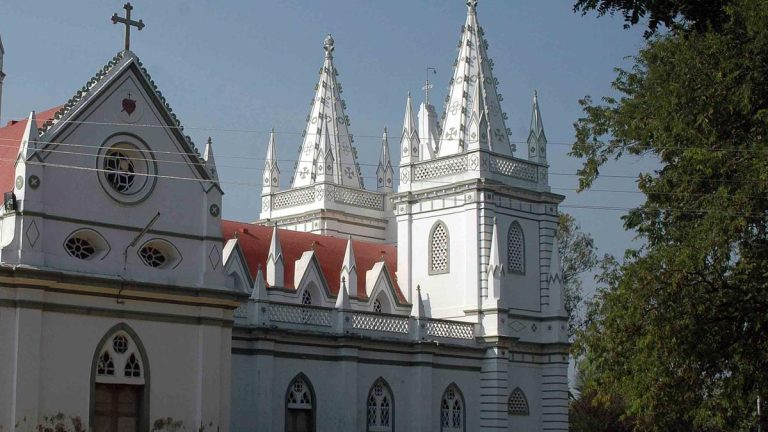
A view of the Thachur village church. | Photo credit: A. Muralitharan
WEven as caste discrimination against Dalit Hindus continues to spark outrage in Tamil Nadu, the deep penetration of caste into Christianity has also become a matter of concern.
In recent years, the state has witnessed a battle within Christianity to recognize Dalits as equals in the diocese. The issue has gained political traction with the recent release of the book by the writer Nivedita Louis Christhuvathil Jathi(Caste in Christianity) by Lok Sabha MP Thol Thirumavalavan, who heads the Dalit party, Viduthalai Chiruthaigal Katchi. Mr. Thirumavalavan highlighted the “strange phenomenon” in India where Christianity took root without any fundamental change in society. “The roots of caste have nourished Christianity (in India)” and it does not have “the roots of Christian values,” he said.
Literary works have been a tool to expose the strong caste-based divisions within Christianity. The acclaimed autobiographical work, Karukku, explored Dalit Christian author Bama’s disillusionment with caste oppression within the Church and its institutions. Likewise, Yaathirai (Pilgrimage), a novel by Father Mark Stephen, vividly depicts the denial of rights of Dalit Christians, especially in church administration and in organizing festivals. The novel is the result of his observations, as parish priest of Ongur, between 1984 and 1990, of the humiliations inflicted on Dalit Christians. His first novel, Suvargal (Walls), stressed the need to demolish the walls that divide the graves of Dalits and upper caste Christians.
Beyond literary works, the fight against caste discrimination in Christianity has lasted for several decades. In the 1990s, the Arockiya Matha Church (established in 1922) in Thachur village in Kancheepuram, where the first Christians had arrived in 1836, was closed for more than 10 years following a legal battle between the upper caste Christians from Reddiar and Dalit Christians. It was reopened in late 2006 following a tripartite agreement involving the Reddiars and two groups of Dalits. Yet five years later, Thachur witnessed a tense standoff and heavy police deployment following the burial of two Dalits in the church graveyard.
The Christian Dalit Liberation Movement of Tamil Nadu-Pondicherry had even requested an audience with Pope John Paul II before his visit to India in November 1999, to highlight “the oppression and persecution of Dalits within the Church” .
Although they constitute the majority in the Catholic order, Dalits are rarely appointed priests or bishops. The Tamil Nadu Untouchability Eradication Front has argued that caste practice is found in the formation of parishes, the denial of Dalit Christians to participate in parish administration and the construction of separate chapels in the same village for Dalits and others. caste Christians. In fact, the Dalit Empowerment Policy in the Catholic Church in India, adopted by the Indian Catholic Bishops’ Conference in 2016, recognizes that the participation of Dalit Christians at the leadership level of diocesan administration and of religious orders is minimal, while at higher levels it is almost zero.
Nearly nine years ago, Mr. Prakash, who was then chairman of the Tamil Nadu State Minorities Commission, publicly admitted that there was discrimination against Dalit Christians in churches. However, neither the Commission nor the government can intervene in this matter “because it is like a fight between members of a family” and must be resolved from within, he said.
The courts have also been approached to demand adequate representation of Dalits within the Roman Catholic Church. Claiming that out of the 18 archdioceses of Tamil Nadu, only one Dalit bishop had been consecrated, a resident of Srivilliputtur, Mr. Anbarasan, had moved the Madurai bench of the Madras High Court, asking the governments to end this discrimination. In August 2021, the court had ordered that the notice be issued to the Center and the state as well as the Apostolic Nuncio to India and the Tamil Nadu Bishops’ Council. The case remains pending.
Politically, Mr. Thirumavalavan said this was not a weakness of Christianity, but “only proves the power of the caste system, which has swallowed up Christianity.” However, from a religious perspective, the right thing for the Church would be to lead by example to ensure that “caste Christian” does not become an acceptable term.


